(待分)B4U4bodylanguagecommunication:noproblem重点短语归纳
- 格式:doc
- 大小:14.50 KB
- 文档页数:2
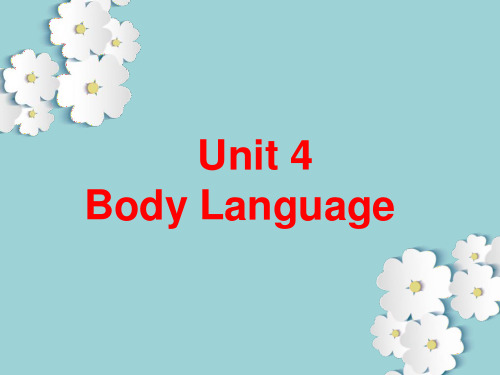
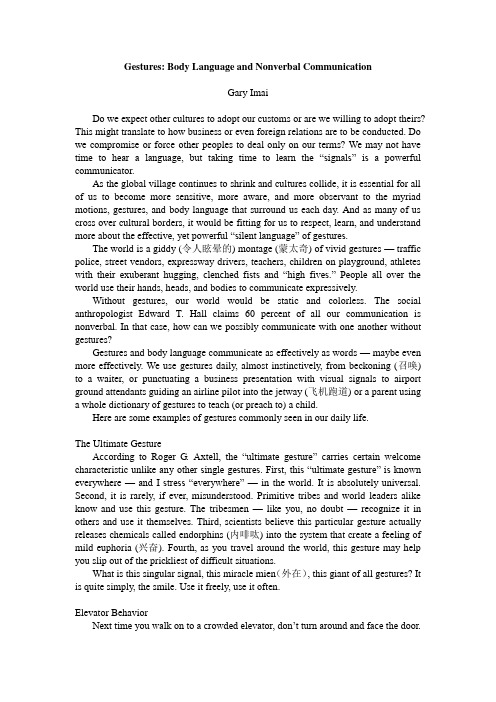
Gestures: Body Language and Nonverbal CommunicationGary ImaiDo we expect other cultures to adopt our customs or are we willing to adopt theirs? This might translate to how business or even foreign relations are to be conducted. Do we compromise or force other peoples to deal only on our terms? We may not have time to hear a language, but taking time to learn the “signals” is a powerful communicator.As the global village continues to shrink and cultures collide, it is essential for all of us to become more sensitive, more aware, and more observant to the myriad motions, gestures, and body language that surround us each day. And as many of us cross over cultural borders, it would be fitting for us to respect, learn, and understand more about the effectiv e, yet powerful “silent language” of gestures.The world is a giddy (令人眩晕的) montage (蒙太奇) of vivid gestures — traffic police, street vendors, expressway drivers, teachers, children on playground, athletes with their exuberant hugging, clenched fists and “high fives.” People all over the world use their hands, heads, and bodies to communicate expressively.Without gestures, our world would be static and colorless. The social anthropologist Edward T. Hall claims 60 percent of all our communication is nonverbal. In that case, how can we possibly communicate with one another without gestures?Gestures and body language communicate as effectively as words — maybe even more effectively. We use gestures daily, almost instinctively, from beckoning (召唤) to a waiter, or punctuating a business presentation with visual signals to airport ground attendants guiding an airline pilot into the jetway (飞机跑道) or a parent using a whole dictionary of gestures to teach (or preach to) a child.Here are some examples of gestures commonly seen in our daily life.The Ultimate GestureAccording to Roger G. Axtell, the “ultimate gesture” carries certain welcome characteristic unlike any other single gestures. First, this “ultimate gesture” is known everywhere —and I stress “everywhere” — in the world. It is absolutely universal. Second, it is rarely, if ever, misunderstood. Primitive tribes and world leaders alike know and use this gesture. The tribesmen —like you, no doubt —recognize it in others and use it themselves. Third, scientists believe this particular gesture actually releases chemicals called endorphins (内啡呔) into the system that create a feeling of mild euphoria (兴奋). Fourth, as you travel around the world, this gesture may help you slip out of the prickliest of difficult situations.What is this singular signal, this miracle mien(外在), this giant of all gestures? It is quite simply, the smile. Use it freely, use it often.Elevator BehaviorNext time you walk on to a crowded elevator, don’t turn around and face the door.Instead, just stand there face the others. If you want to create even more tension, grin. Very likely the other passengers will glare back, surprised, grim, and upset. They respond in this way simply because you have broken the rules.This demonstrates how, even in the most mundane (平凡的) situations, we have a silent set of rules for bodily behavior in public settings.When X people enter an elevator, they each ...Gestures are woven inextricably in to our social lives, but also that the “vocabulary” of gestures, can be at once informative and entertaining ... but also dangerous. Gestures can be menacing (two drivers on a freeway), warm (an open-armed welcome), instructive (a police man giving road directions), or even sensuous (the liquid movement of a Hawaiian hula dancer).In the world of gestures, the best single piece of advice is to remember the two A’s —“Ask” and be “A ware.” If you see a motion or gesture that is new or confusing, ask a local person what it signifies. Then, be aware of the many body signs and customs around you.(Retrieved Sep. 16, 2008, from /~tassi/ gestures.htm, with modifications)。
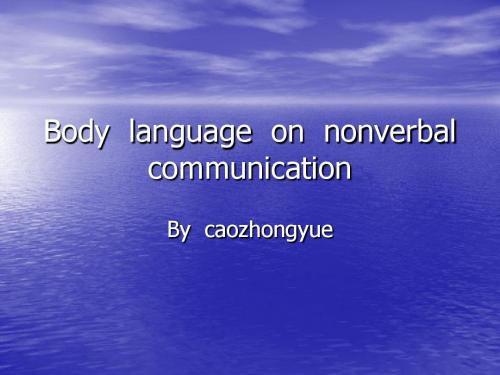
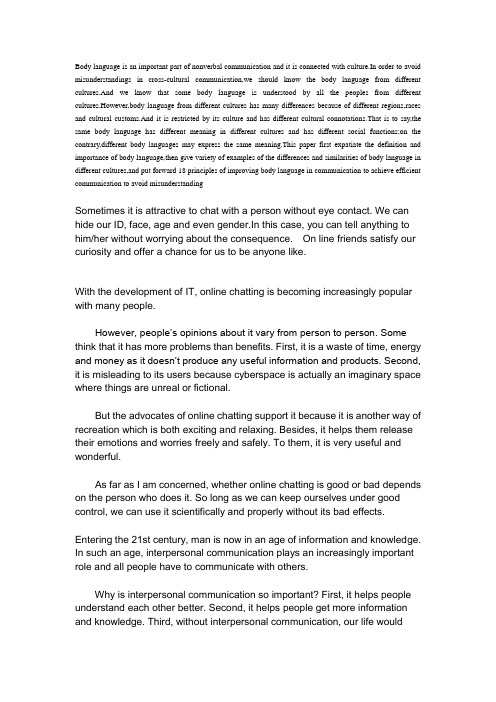
Body language is an important part of nonverbal communication and it is connected with culture.In order to avoid misunderstandings in cross-cultural communication,we should know the body language from different cultures.And we know that some body language is understood by all the peoples from different cultures.However,body language from different cultures has many differences because of different regions,races and cultural customs.And it is restricted by its culture and has different cultural connotations.That is to say,the same body language has different meaning in different cultures and has different social functions;on the contrary,different body languages may express the same meaning.This paper first expatiate the definition and importance of body language,then give variety of examples of the differences and similarities of body language in different cultures,and put forward 18 principles of improving body language in communication to achieve efficient communication to avoid misunderstandingSometimes it is attractive to chat with a person without eye contact. We can hide our ID, face, age and even gender.In this case, you can tell anything to him/her without worrying about the consequence. On line friends satisfy our curiosity and offer a chance for us to be anyone like.With the development of IT, online chatting is becoming increasingly popular with many people.However, people’s opinions about it vary from person to person. Some think that it has more problems than benefits. First, it is a waste of time, energy and money as it doesn’t produce any useful information and products. Second, it is misleading to its users because cyberspace is actually an imaginary space where things are unreal or fictional.But the advocates of online chatting support it because it is another way of recreation which is both exciting and relaxing. Besides, it helps them release their emotions and worries freely and safely. To them, it is very useful and wonderful.As far as I am concerned, whether online chatting is good or bad depends on the person who does it. So long as we can keep ourselves under good control, we can use it scientifically and properly without its bad effects.Entering the 21st century, man is now in an age of information and knowledge. In such an age, interpersonal communication plays an increasingly important role and all people have to communicate with others.Why is interpersonal communication so important? First, it helps people understand each other better. Second, it helps people get more information and knowledge. Third, without interpersonal communication, our life wouldbecome a desert of emotion and friendship. Last but not the least, communication between people makes our life lively, interesting and lovely.In a word, humans, as social animals, have to communicate with each other, the importance of which can never be overemphasized.Why is interpersonal communication so important? Interpersonal communication is just like a bridge of understanding between people. For example, it helps students to learn more effectively if one can communicate more with his teachers and classmates. In a family, communication makes the family members understand each other better and get closer. In the workplace, communication between the employer and the employed creates a friendly and helpful working environment.I prefer to live in the big city.There are many reasons explain that I select the big city. Firstly, I think that live in the big city is helpful for the development of individual. The economic development in the big city is better than in the small one. I am a graduate student, I have read so many books and get so much knowledge, and so I really hope to have achievements. In the big city, the possibility of success is more than in the small city. Live there, there are better, larger companies to offer the opportunities of the development to us. With the development of the economy and the civilization in the world, in the 21st century, knowledge and information will be more important. In the big city, I can get them rapidly then utilize them quickly. For us, the big city is the place near the dreamSecond, I think I can live more convenient in the big city. If I live in the small city, maybe there is nothing what I want or I could buy it far from where I live. On the other hand, I can buy anything I want and needn’t run very far in the big city. The traffic is more convenient and there are various traffic tools and I can spend the lest time to arrive where I want. It i s helpful for person’s communication and social contact.The last reason is that, I like play. In the big city there are the best facilities. Small city is suit for relax and the big city is suit for entertainment.So I prefer to live in the big city.I like to live in countryside,living in a big city will lower one's life span while living in a small town will make me very happy.Also I can not have a life like living in the country,but I of cause will have a good time together with those birds,those flowers and big trees.I can do whatever I want to do,no matter when I want to go out I will just do it.Camparing to life in the city with the same amount of money ,I can have a better life in the countryside as the goods there are always cheaper than that of the city.Maybe with 500 rmb I can live for three months rather than one month in the city.The environment surrounding you in the city is not so satisfactory,people seeing each other will just smile at each other when coming across each other,on the contrary,if you live in a town ,the people there will let you know what is hospitality and what is the true harmony.They will talk to you whenever they see you and invite you to their homes to have diner,you just hard to turn them down.SO in a word ,I individual like living in countryside much better.There is an inclination in the modern society to abandon the country and to migrate to the city. It's apparent that country life is underestimated by a great number of people. As the matter of fact, while there are many who prefer the vibrant urban lifestyle, I prefer the country living.I notice that country living in not everyone's cup of tea. The advantages of living in the city, as some will claim, are that there are more conveniences, more opportunities, more forms of entertainments. In short, just simply more of everything. These all might sound convenient, and most of the time it is. Nonetheless, people are always busy like to do as much as they can, as quickly as they can. Many people do not think there's anything wrong with a fast paced urban life as well as the hustle and bustle, traffic fumes and pollution.In the country, pollution is scarce. You may lay in the grass and gaze upwards into the infinite beyond and see shining stars at night. No worries of hazardous smoke and awful fume, open fields and trees are seen everywhere.Besides, countryside is a great place for families to raise children. It's widely agreed that country families are closer knit then city families. It's very interesting that, childhood education in the country is significantly better than ina city; smaller class sizes and larger budgets create excellent learning environments.Next, the country lifestyle is far more healthy. Time moves at a more leisurely pace in the country. Life is much less distressing, it is more private in lifestyle and nature, and it is where one can expect to find a sense of social balance. Besides, when I buy some food in local I just know for sure that its quality is farm-fresh. I also have chances to do lots of outdoor activities. In short, I'm more likely to eat healthier food, get more exercise and stay stress-free.In conclusion the country is a far better place to live as it takes you away from the concrete jungles into the embrace of mother nature. Country life is the life for me, I love the serenity and peaceful living of the country life.。
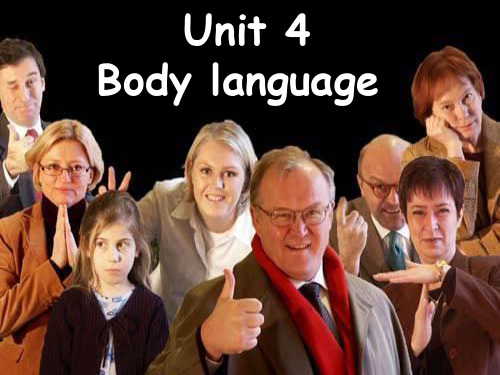

Body Language and Non-verbalCommunicationBook4module3BodyLanguageandNon-verbalcommunication LearningPaper4ExerciseⅠ.Bestchoice.---$500,butthatismylastoffer.---ok,it’sa______.A.costB.pricec.dealD.reward2.Herfacegaveher____whenshetoldalie.A.offB.upc.awayD.out3.Shestilllovedhim___hehadtreatedhersobadly.A.howeverB.eventhoughc.whateverD.however4.whenhewasinNewyork,hemethisgoodfriendjim______.A.byaccidentB.bymistakec.bythewayD.bythetime5.Heis____agoodfathertome;heisalsomybestfriend.A.notB.onlyc.morethanD.really6.Herbrother_____toleaveherinthedarkroomalonewhensh edisobeyedhisorder.A.declaredB.threatenedc.warnedD.frightened7.Heisamanoffewwords;besides,itishardto____hismind.A.readB.seec.makeitclearD.lookat8.---won’tyougoshoppingwithyourmother?---____shepromisestobuymeanewsweater.A.NowthatB.Incasec.IfD.Unless9._____otherssay,theprofessorissurethathistheoryisc orrect.A.NomatterhowB.whatc.whateverD.How0.Paper-makingbeganinchinaandfromhereit_____toNorth AmericaandEurope.A.spreadB.grewc.carriedD.developed1.Hetriedhisbesttosolvetheproblem,_____difficultitw as.A.howeverB.nomatterc.whateverD.although2.____shewastired,____shewentonworking.A.Though;butB.when;andc.Though;/D.Because;/3.Theweather____tohourinsomemountaindistricts.A.varyfromanhourB.variesfromhourc.isdifferentfromanhourD.differfromanhour4.Istaredblankly___thepaperinfrontofme.A.inB.atc.downD.out5.Visitors____nottotouchtheexhibits.A.willrequestB.requestc.arerequestingD.arerequestedⅡ.Filltheblankswithproperprepositions..Ifeltsadwhenshesaidgoodbye____me.2.whateverheis,heshouldn’tberude____me.3.Thesoldier____guarddidn’tletmeentertheroom.4.InsomeAsiancountries,youmustn’tsitwithyourfeetpointing____anotherperson.5.Heisamanhardtodeal_____.6.Inthatcountry,youmustn’ttouchsomeoneonthehead,even____accident.7.Ifyoukeepstaring_____thatlady,youwillmakeheruncomfo rtable.8.Idon’twanttobeinvolved____thatproblem.Ⅲ.completethefollowingsentenceswiththewordsgiven,u singproperformswhennecessary.1.youcan’t____abarofsteeleasilywithoutatool.2.whilewatchingtheperformance,thechildrencheeredand _____theirhands.3.Hemadesome_____toexpresswhathewanted.4.weshouldavoid_____atpeoplebecauseitisbadmanners.5.Thewomanfelthisson’s______andfoundthathehadafever.Ⅳ.Translation..如果他12点前不来,我们就不等他了。
陈述,说明
. 问候,迎接某人
. 语言的目的
. 举例
代表,描绘,表现,象征
……把…描绘成…; ……称…是…
.
. 学生会
. 寝室
. 食堂
. 航班
. 好奇地四处张望
. 对…感到好奇。
急于做…极想做…
, 出于好奇
. 哥伦比亚
. 接近,走近。
方法,通道
想办法接近某人. 靠近…
春天的到来
…通向…的道路
在…临近的时候
. 脸颊
. 防卫
保卫…以免受
防卫,保卫为保卫…,为…辩护
. 后退
. 一个重大误解
约旦
. 猛冲
. 伸出手去…
成年人
. 同样…
. 口语
. 表达感情
. 身体距离
. 很有可能
. 与…握手
. 对…点头
. 避免交流中的困难一般而言一般来说. 西班牙
. 意大利
. 十字路口
. , , 入乡随俗
. 各种各样
. 即使
. 误解
. 通用的脸部表情
. 功能
. …使…放心
真地
假的,错误的
丢脸
显示愤怒
. 背对…
.皱眉.
. 点头
握拳
. 从…转过眼神(不看) . 哈欠
. 主观的
. 对…表示尊重
. 拥抱…
. 愿意…
一个更高的等级。